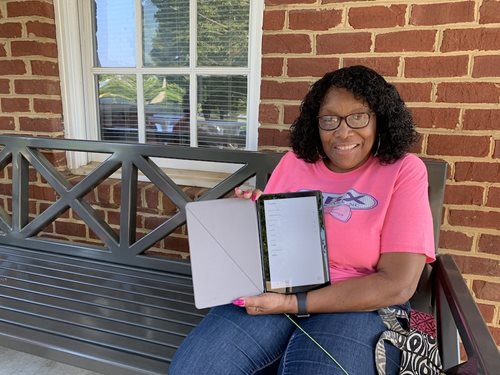Grace Sparks liked helping her neighbors with their computers and smart phones. So when Better Housing Coalition, a NeighborWorks network organization in Richmond, Virginia, gave her a chance to formalize that relationship by becoming a "technology navigator," she jumped at it.

The kickoff takes place during NeighborWorks Week. Held June 4-11, the theme for this year's NeighborWorks is Empowering Communities for Success. Helping older residents works with technology sets them up for success by enabling them to combat isolation, connect to telehealth services and more.
"The navigators will help our seniors with all kinds of things – learning to navigate websites and simple things, like if they can't remember their password," says Stacie Birchett, vice president for External Affairs. "We wanted someone close by that was willing to help." Navigators will take a course to learn about keeping accounts secure, how to help residents apply for benefits online, and more.
Kate Noon, director of senior services, hopes the navigator program will become a model for the region. "To participate in many parts of life now, you need access to technology," she says. According to an AARP 50-Plus study, more than 60% of adults used technology to stay connected, while 59% use it for entertainment and 47% use it to manage responsibilities.
Over the past two years, Noon's division has worried as adults were becoming increasingly isolated. And they fear the future might hold similar periods of isolation. "We're hoping this will help people learn to connect with family online – to set up an email address or to interact on social media. They can go online and exercise with Youtube videos. They can attend church online. They can access graduations. There are so many things older adults aren't even aware they can have access to."
The online connectivity can also help residents build community connectivity in person, too, says Birchett. One of the buildings opened in December 2020 and because of the pandemic, neighbors didn't have the "regular" opportunities to interact and meet one another. The navigators, especially, seem eager to meet new neighbors by working with them on technology.
There's a cost savings component as well. She's seen residents who pay $3 a month to receive bills and papers by mail because they don't have the technology to bank online. "It adds up," she says. "Now they'll have the tools to participate more fully in the world."
Sparks says she's encountered neighbors who don't know a lot about computers or the internet. "They're afraid they might break it." But she's helped neighbors navigate email and learn to get on Facebook and figure out their smart phones. "I think it will be good for them," she says of learning new technology. "It can help in every way."
Sparks, 71, has a tablet, computer and smartphone, and uses for everything from paying medical bills to coloring and connecting with her family. "You have to keep your mind occupied," she says. "You live longer that way."

